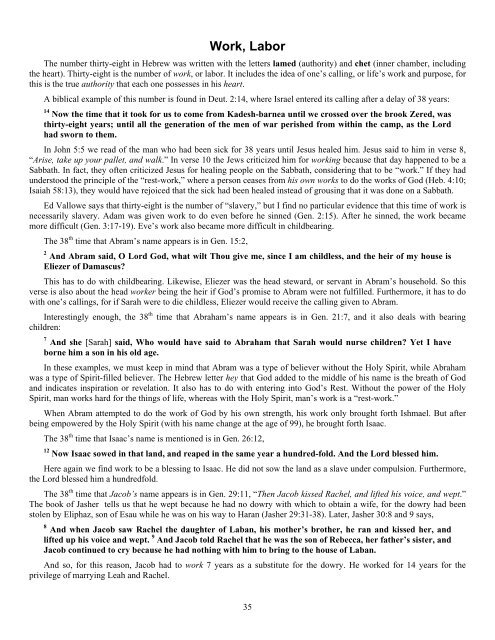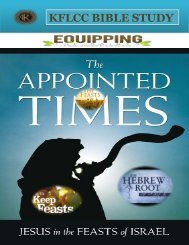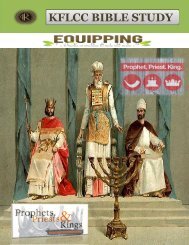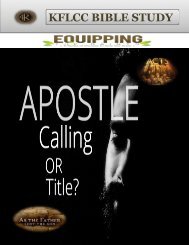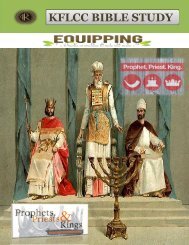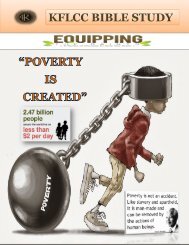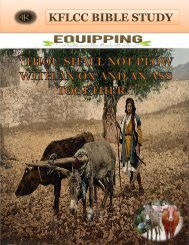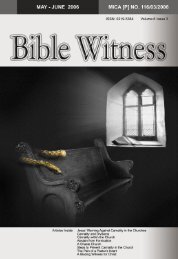Create successful ePaper yourself
Turn your PDF publications into a flip-book with our unique Google optimized e-Paper software.
Work, Labor<br />
The number thirty-eight in Hebrew was written with the letters lamed (authority) and chet (inner chamber, including<br />
the heart). Thirty-eight is the number of work, or labor. It includes the idea of one’s calling, or life’s work and purpose, for<br />
this is the true authority that each one possesses in his heart.<br />
A biblical example of this number is found in Deut. 2:14, where Israel entered its calling after a delay of 38 years:<br />
14 Now the time that it took for us to come from Kadesh-barnea until we crossed over the brook Zered, was<br />
thirty-eight years; until all the generation of the men of war perished from within the camp, as the Lord<br />
had sworn to them.<br />
In John 5:5 we read of the man who had been sick for 38 years until Jesus healed him. Jesus said to him in verse 8,<br />
“Arise, take up your pallet, and walk.” In verse 10 the Jews criticized him for working because that day happened to be a<br />
Sabbath. In fact, they often criticized Jesus for healing people on the Sabbath, considering that to be “work.” If they had<br />
understood the principle of the “rest-work,” where a person ceases from his own works to do the works of God (Heb. 4:10;<br />
Isaiah 58:13), they would have rejoiced that the sick had been healed instead of grousing that it was done on a Sabbath.<br />
Ed Vallowe says that thirty-eight is the number of “slavery,” but I find no particular evidence that this time of work is<br />
necessarily slavery. Adam was given work to do even before he sinned (Gen. 2:15). After he sinned, the work became<br />
more difficult (Gen. 3:17-19). Eve’s work also became more difficult in childbearing.<br />
The 38 th time that Abram’s name appears is in Gen. 15:2,<br />
2 And Abram said, O Lord God, what wilt Thou give me, since I am childless, and the heir of my house is<br />
Eliezer of Damascus?<br />
This has to do with childbearing. Likewise, Eliezer was the head steward, or servant in Abram’s household. So this<br />
verse is also about the head worker being the heir if God’s promise to Abram were not fulfilled. Furthermore, it has to do<br />
with one’s callings, for if Sarah were to die childless, Eliezer would receive the calling given to Abram.<br />
Interestingly enough, the 38 th time that Abraham’s name appears is in Gen. 21:7, and it also deals with bearing<br />
children:<br />
7 And she [Sarah] said, Who would have said to Abraham that Sarah would nurse children? Yet I have<br />
borne him a son in his old age.<br />
In these examples, we must keep in mind that Abram was a type of believer without the Holy Spirit, while Abraham<br />
was a type of Spirit-filled believer. The Hebrew letter hey that God added to the middle of his name is the breath of God<br />
and indicates inspiration or revelation. It also has to do with entering into God’s Rest. Without the power of the Holy<br />
Spirit, man works hard for the things of life, whereas with the Holy Spirit, man’s work is a “rest-work.”<br />
When Abram attempted to do the work of God by his own strength, his work only brought forth Ishmael. But after<br />
being empowered by the Holy Spirit (with his name change at the age of 99), he brought forth Isaac.<br />
The 38 th time that Isaac’s name is mentioned is in Gen. 26:12,<br />
12 Now Isaac sowed in that land, and reaped in the same year a hundred-fold. And the Lord blessed him.<br />
Here again we find work to be a blessing to Isaac. He did not sow the land as a slave under compulsion. Furthermore,<br />
the Lord blessed him a hundredfold.<br />
The 38 th time that Jacob’s name appears is in Gen. 29:11, “Then Jacob kissed Rachel, and lifted his voice, and wept.”<br />
The book of Jasher tells us that he wept because he had no dowry with which to obtain a wife, for the dowry had been<br />
stolen by Eliphaz, son of Esau while he was on his way to Haran (Jasher 29:31-38). Later, Jasher 30:8 and 9 says,<br />
8 And when Jacob saw Rachel the daughter of Laban, his mother’s brother, he ran and kissed her, and<br />
lifted up his voice and wept. 9 And Jacob told Rachel that he was the son of Rebecca, her father’s sister, and<br />
Jacob continued to cry because he had nothing with him to bring to the house of Laban.<br />
And so, for this reason, Jacob had to work 7 years as a substitute for the dowry. He worked for 14 years for the<br />
privilege of marrying Leah and Rachel.<br />
35


